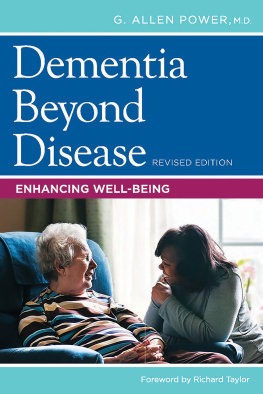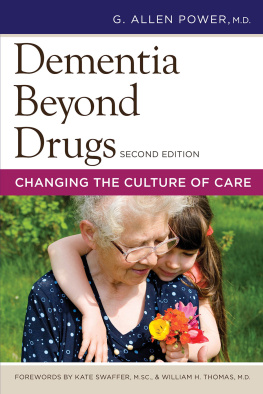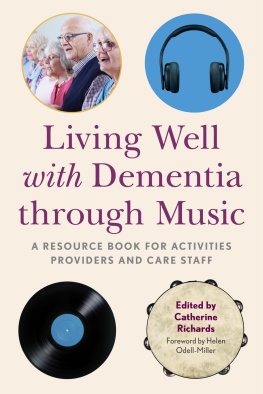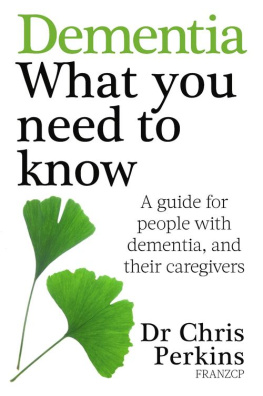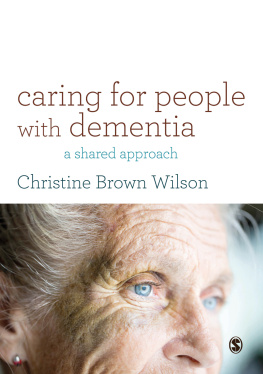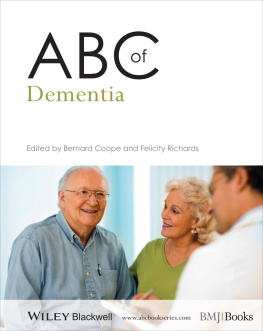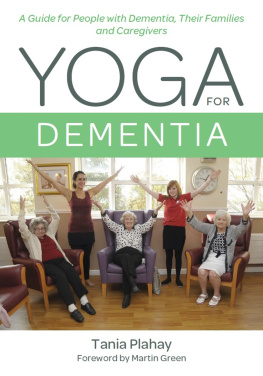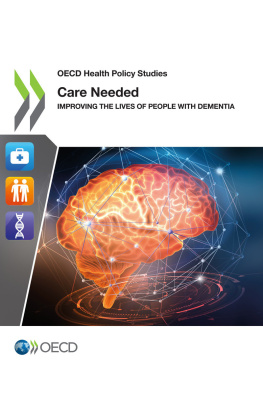

Health Professions Press, Inc.
Post Office Box 10624
Baltimore, Maryland 21285-0624
www.healthpropress.com
Copyright 2014, 2017 by Health Professions Press, Inc.
All rights reserved.
Interior and cover designs by Mindy Dunn.
Cover photo by Tracy Koflanovich. Copyright 2014 by Tracy Jade Photography.
Cover photo taken at St. Johns Penfield Green House homes.
Typeset by Barton Matheson Willse & Worthington, Baltimore, Maryland.
Manufactured in the United States of America by Maple Press, York, Pennsylvania.
Quotes in from Shanks, L. K., Your Name Is Hughes Hannibal Shanks: A Caregivers Guide to Alzheimers, copyright 1999 by the University of Nebraska Press.
epigraphs from John Lennon and Paul McCartney are lyrics from I Am the Walrus and Hello Goodbye, respectively. Both songs written by John Lennon and Paul McCartney. Copyright 1967 Sony/ATV Tunes LLC. All rights administered by Sony/ATV Music Publishing LLC. All rights reserved. Used by permission.
The names of the people with dementia in this book have been changed to respect their privacy.
The information provided in this book is in no way meant to substitute for the advice or opinion of a medical, legal, or other professional expert. This book is sold without warranties of any kind, express or implied, and the publisher and authors disclaim any liability, loss, or damage caused by the contents of this book.
Library of Congress Cataloging-in-Publication Data
Names: Power, G. Allen, author.
Title: Dementia beyond disease : enhancing well-being / by G. Allen Power ; foreword by Richard Taylor.
Description: Revised edition. | Baltimore, Maryland : Health Professions Press, Inc., [2017] | Includes bibliographical references and index.
Identifiers: LCCN 2016037239 (print) | LCCN 2016037830 (ebook) | ISBN 9781938870699 (pbk.) | ISBN 9781938870705 (epub)
Subjects: | MESH: Dementiatherapy | Dementiapsychology | Quality of Lifepsychology | Health Services for the Aged | Patient-Centered Care
Classification: LCC RC521 (print) | LCC RC521 (ebook) | NLM WM 220 | DDC 616.8/3dc23
LC record available at https://lccn.loc.gov/2016037239
British Library Cataloguing in Publication data are available from the British Library.
Additional titles on improving dementia care
Dementia Beyond Drugs:
Changing the Culture of Care (2nd Edition)
Alzheimers from the Inside Out
Speaking Our Minds:
What Its Like to Have Alzheimers (Revised Edition)
The Best Friends Approach to Dementia Care (2nd Edition)
Whole Person Dementia Assessment
CONTENTS
Table of Contents
Guide
ABOUT THE AUTHOR
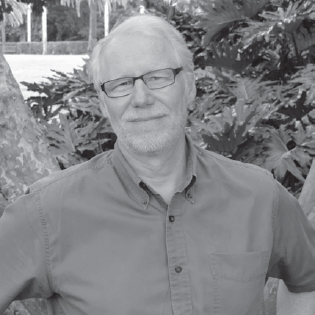
G. Allen Power, M.D., is a board-certified internist and geriatrician and Clinical Associate Professor of Medicine at the University of Rochester, New York. He is a Fellow of the American College of PhysiciansAmerican Society of Internal Medicine, and an international educator on transformational models of care for older adults, particularly those living with changing cognitive abilities.
Dr. Powers first book, Dementia Beyond Drugs: Changing the Culture of Care, was originally published by Health Professions Press in 2010 and later re-published as a second edition (2017). It was named Book of the Year in 2010 by the American Journal of Nursing (in Psychiatric/Mental Health Nursing).
Dr. Power served on the technical advisory panel for the U.S. Center for Medicare and Medicaid Services for their national antipsychotic reduction initiative. He was named one of Five Leaders of Tomorrow by Long-Term Living Magazine in May 2013 and was interviewed for the film Alive Inside, winner of the Audience Award for Best U.S. Documentary at the 2014 Sundance Film Festival. He is a popular speaker on the subject of transformational dementia care, both nationally and internationally, and was a member of the Scientific Program Committee and a keynote speaker for the 2015 Alzheimers Disease International Conference in Perth, Western Australia.
An accomplished musician and songwriter, Dr. Powers music has been performed on three continents. His song of elder autonomy, If You Dont Mind, was performed by Peter, Paul and Mary, and Walter Cronkite used his song Ill Love You Forever in a 1995 Discovery Channel documentary on American families.
FOREWORD
Authors Note
Although the world lost Richard Taylor in 2015, his words are as relevant today as when he provided this Foreword in 2014. As I wrote at the time of his death, I was proud to call Richard my friend and occasional traveling and speaking companion. But most important, he was my greatest teacher in my quest to understand how better to support people whose minds have changed. I was honored to have him contribute to this book when it first published.
Mighty oaks from little acorns grow.
Hello, I am Richard Taylor, and for the past several, several years I have been living with the symptoms and diagnosis of dementia, probably of the Alzheimers type. Several years ago a youngish man (understand, I am 70 years old at this writing) called me and said he wanted to talk. That call from Al Power planted the acorn that has become the sapling that is now our on-growing relationship. We have spoken together many times, broken bread together many, many times, and conversed with each other for hundreds of hours.
I have self-discovered from him, and he from yours truly. Together we have each refined and expanded our own views of ourselves, of dementia, of aging, and of life in general. We have commiserated together about the awful state of affairs concerning dementia, stigmas, aging in this century, and living with the disabilities associated with dementia of this or that type. We have dreamt, plotted, planned, and wished what the future might look like, feel like, and be like for elders, folks who forget more than others, folks living in nursing homes, and folks whose brain functions have changed as they have aged.
We have both, from our own experiences, education, and perspectives, become advocates for a humane, humanizing understanding and response to aging. We both stand up and speak out most every chance we get about this increasingly clear vision we share of how the oaks should be shaped as they grow into the mighty classification. Concluding that the stigmas associated with the symptoms and label of dementia (I am fading away, I will die a shell of myself, I am more to be pitied than censured...) are reversible, we each in our own ways have become evangelists for a set of beliefs that is based on the fact that everyone is always a whole person until about 2 or 3 minutes after he or she has drawn a last breath.
This book is the second snapshot shown to the public of the work-in-progress that is Als mind (the first being Dementia Beyond Drugs). This latest work is well worth your time reading and considering; that is, how it might impact your relationships, your job, your family, and yourself. In these pages are the considered words of a considered human being. He has taken the original thinking of Abraham Maslow and updated, clarified, and focused the ideas and assumptions that we all share the same basic human needs and will share those needs regardless of what disabilities have befallen us. He makes a strong case for a major shift in how we view growing old in our society. He draws upon science, literature, and his own life experiences and thinking to suggest not just a better way to grow older, but the best (he would argue the only) way for individuals to grow into mighty oaks, regardless of soil conditions, droughts, insect and bacteria infestations, and dementia (pardon the mixed metaphor).

